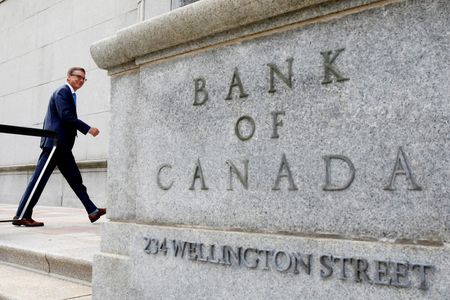By Steve Scherer and David Ljunggren
OTTAWA (Reuters) – The Bank of Canada will study the most recent economic data to gauge whether to raise interest rates further, a deputy governor said on Thursday, adding it would still move forcefully if necessary.
The central bank on Wednesday hiked its benchmark overnight rate by half a percentage point to the highest level in almost 15 years and signaled its unprecedented tightening campaign was near its end.
“We expect our decisions will be more data-dependent,” Deputy Governor Sharon Kozicki said in a speech in Montreal, adding the bank was still prepared to be “forceful” with rates if necessary.
“We are moving from how much to raise interest rates to whether to raise interest rates.”
The bank’s next policy-setting meeting will be on Jan. 25.
Asked to clarify if being prepared to be “forceful” meant the bank was still prepared to make oversized rate moves, Kozicki said it was a hypothetical.
“If there were to be a really large shock, we would be prepared to act forcefully… to rein things in,” she told reporters.
The central bank has lifted rates at a record pace of 400 basis points in nine months to 4.25% – a level last seen in January 2008 – to fight inflation that is far above its target.
“With the labor market still tight and businesses still finding it easy to raise their prices, Governing Council agreed that the economy still needs a more sustained moderation of demand,” Kozicki said.
On Wednesday, the bank cited still-strong growth and tight labor markets but eliminated the forward guidance it has used since it began cranking rates higher in March, dropping language that said they would have to rise further.
Inflation, which clocked in at 6.9% in October, “remains too high” at more than three times the bank’s 2% target, Kozicki said. But three-month rates of core inflation have declined to about 3.5%, Kozicki said, an indication “that momentum in inflation is easing”.
“Overall, these comments don’t change our tentative view that the Bank of Canada is ready to hit the pause button,” said Royce Mendes, head of macro strategy at Desjardins Group.
Deliberations ahead of Wednesday’s rate hike centered on how supply challenges are resolving, how higher rates are slowing demand, and how inflation and inflation expectations are evolving, Kozicki said.
“The fact that inflation is high, the fact that expected inflation is high, is… for us a reason to be taking the exact decision that we did take with 50 basis points” on Wednesday, Kozicki said.
While third-quarter growth remained strong, softening demand in interest-rate sensitive areas like housing activity are signs that tighter monetary policy is “working to rebalance supply and demand”, she said.
Kozicki reiterated that starting next year, the bank will release a “summary of deliberations” in an effort to provide more transparency.
The Canadian dollar was trading 0.5% higher at 1.3580 to the greenback, or 73.64 U.S. cents.
(Additional reporting by Fergal Smith in Toronto; Editing by Deepa Babington and John Stonestreet)

